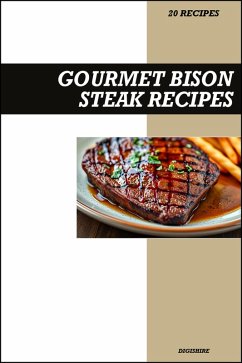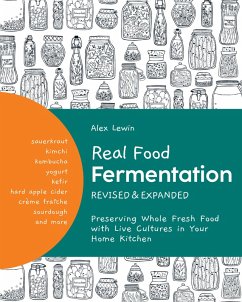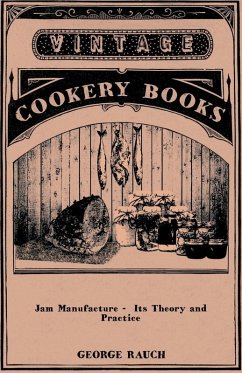
Taste Evaluation Theory Revised Edition (eBook, ePUB)

PAYBACK Punkte
0 °P sammeln!
A groundbreaking guide that systematically explores the world of taste through a multidisciplinary approach encompassing science, philosophy, and culture, presenting 75 practical evaluation criteria to elevate readers' palates.The Theory of Taste Evaluation offers readers an in-depth opportunity to understand and experience the world of taste through scientific, philosophical, and cultural inquiries. It introduces a systematic method of taste analysis grounded in neuroscience, cognitive science, and biomechanics, and provides a practical taste evaluation questionnaire with 75 detailed criteria...
A groundbreaking guide that systematically explores the world of taste through a multidisciplinary approach encompassing science, philosophy, and culture, presenting 75 practical evaluation criteria to elevate readers' palates.
The Theory of Taste Evaluation offers readers an in-depth opportunity to understand and experience the world of taste through scientific, philosophical, and cultural inquiries. It introduces a systematic method of taste analysis grounded in neuroscience, cognitive science, and biomechanics, and provides a practical taste evaluation questionnaire with 75 detailed criteria. This enables readers to assess and refine their sensory experiences independently.
The book delves into the roles and interactions of the five senses in the perception of taste, as well as the psychological and cultural factors influencing taste experiences. It examines the connections between taste, philosophy, religion, and culture, shedding light on how taste transcends mere sensory experience to profoundly impact human life and society.
Through a 15-step framework for savoring taste, readers are offered a roadmap to evaluate and enhance their level of sensory awareness. The guide also details how knowledge of taste evaluation can be applied in various fields, such as culinary arts, dining, the food industry, health, education, and art. This makes it a valuable resource not only for chefs, food critics, and professionals in the food industry but also for general readers seeking to refine their palate and gain practical insights.
By fostering a deep understanding of taste, the book enriches readers' everyday dining experiences, enhances cultural sensitivity, supports the development of healthy eating habits, and provides opportunities for philosophical reflection on self and society. Ultimately, it offers a comprehensive perspective on how taste influences our lives, culture, and society, helping readers sharpen their senses, improve their quality of life, and broaden their cultural understanding. This book serves as a holistic guide to navigating the world of taste and its profound connection to human experience.
The Theory of Taste Evaluation offers readers an in-depth opportunity to understand and experience the world of taste through scientific, philosophical, and cultural inquiries. It introduces a systematic method of taste analysis grounded in neuroscience, cognitive science, and biomechanics, and provides a practical taste evaluation questionnaire with 75 detailed criteria. This enables readers to assess and refine their sensory experiences independently.
The book delves into the roles and interactions of the five senses in the perception of taste, as well as the psychological and cultural factors influencing taste experiences. It examines the connections between taste, philosophy, religion, and culture, shedding light on how taste transcends mere sensory experience to profoundly impact human life and society.
Through a 15-step framework for savoring taste, readers are offered a roadmap to evaluate and enhance their level of sensory awareness. The guide also details how knowledge of taste evaluation can be applied in various fields, such as culinary arts, dining, the food industry, health, education, and art. This makes it a valuable resource not only for chefs, food critics, and professionals in the food industry but also for general readers seeking to refine their palate and gain practical insights.
By fostering a deep understanding of taste, the book enriches readers' everyday dining experiences, enhances cultural sensitivity, supports the development of healthy eating habits, and provides opportunities for philosophical reflection on self and society. Ultimately, it offers a comprehensive perspective on how taste influences our lives, culture, and society, helping readers sharpen their senses, improve their quality of life, and broaden their cultural understanding. This book serves as a holistic guide to navigating the world of taste and its profound connection to human experience.
Dieser Download kann aus rechtlichen Gründen nur mit Rechnungsadresse in A, B, CY, CZ, D, DK, EW, E, FIN, F, GR, H, IRL, I, LT, L, LR, M, NL, PL, P, R, S, SLO, SK ausgeliefert werden.













